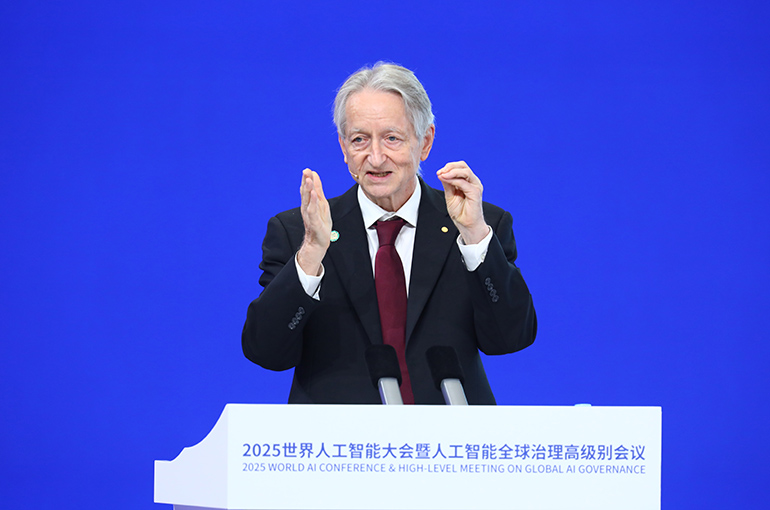 'AI Godfather' Geoffrey Hinton Warns About AI Takeover Risks at WAIC in Shanghai
'AI Godfather' Geoffrey Hinton Warns About AI Takeover Risks at WAIC in Shanghai(Yicai) July 28 -- Geoffrey Hinton, known as the godfather of artificial intelligence, delivered a keynote speech during the World AI Conference in Shanghai, warning of AI takeover risks.
"We are creating AI agents that can help us complete tasks, and they will want to do two things: first is to survive, and second is to achieve the goals we assign to them," Hinton said during his speech titled "Will Digital Intelligence Replace Biological Intelligence?' at the WAIC on July 26. "To achieve the goals we set for them, they also hope to gain more control.
"We cannot easily change or shut them [AI agents] down. We cannot simply turn them off because they can easily manipulate the people who use them," Hinton noted. "At that point, we would be like three-year-olds, while they are like adults, and manipulating a three-year-old is very easy."
While some people think that when AI agents become smarter than us, we can just shut them down, Hinton believes that this is unrealistic because they will manipulate and persuade the operators not to shut them down.
"Our current situation is like someone keeping a tiger as a pet," Hinton said as an example. "A tiger cub can indeed be a cute pet, but if you continue to keep it, you must ensure that it does not kill you when it grows up.
"Generally speaking, keeping a tiger as a pet is not a good idea, but if you do keep a tiger, you have only two choices: either train it so that it doesn't attack you, or eliminate it," he explained. "For AI, we have no way to eliminate it."
In a speech last December, Hinton said that there is a 10 to 20 percent chance that AI could lead to human extinction within the next three decades. He also suggested that at least one-third of computing resources should be used to ensure that AI systems remain aligned with human intentions.
In an exclusive interview with Yicai at the WAIC, Hinton emphasized that preventing AI from replacing humans is a shared global concern, unlike other areas where national interests diverge.
"People cooperate when interests are aligned," Hinton told Yicai. "All countries want to prevent that [AI from taking over people], and if any country discovers a good way of doing that, they would be very happy to share it with other countries because they don't want AI taking over."
Hinton suggested each country conduct its own sovereign research to make AI beneficial, but share the results with everyone.
Hinton, 77, won the 2024 Nobel Prize in Physics and the 2019 Turing Award, often called the 'Nobel Prize in Computing.' His pioneering work on neural networks in the 1980s laid the foundation for today's AI boom. He has become increasingly vocal about AI risks since leaving Google in 2023 to speak more freely about the technology's dangers.
Before his WAIC speech, Hinton also participated in the fourth International Dialogues on AI Safety and co-signed the Shanghai Consensus on AI Safety International Dialogue with over 20 AI industry experts.
Editor: Futura Costaglione